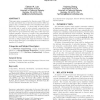Free Online Productivity Tools
i2Speak
i2Symbol
i2OCR
iTex2Img
iWeb2Print
iWeb2Shot
i2Type
iPdf2Split
iPdf2Merge
i2Bopomofo
i2Arabic
i2Style
i2Image
i2PDF
iLatex2Rtf
Sci2ools
EMSOFT
2007
Springer
2007
Springer
Leveraging synchronous language principles for heterogeneous modeling and design of embedded systems
This paper gives a semantics for discrete-event (DE) models that generalizes that of synchronous/reactive (SR) languages, and a continuous-time (CT) semantics that generalizes the DE semantics. It shows that all three semantic models can be used in actor-oriented composition languages, and that despite the fact that CT is the most general, there are good reasons for using each of the more specialized semantics. Moreover, because of the generalization relationship between them, these three models of computation (MoCs) compose hierarchically in arbitrary order. We describe a design system that supports arbitrary combinations of these three MoCs, leveraging the actor abstract semantics of Ptolemy II. Categories and Subject Descriptors D.2.2 [Software Engineering]: Design Tools and Tech
| Added | 07 Jun 2010 |
| Updated | 07 Jun 2010 |
| Type | Conference |
| Year | 2007 |
| Where | EMSOFT |
| Authors | Edward A. Lee, Haiyang Zheng |
Comments (0)

